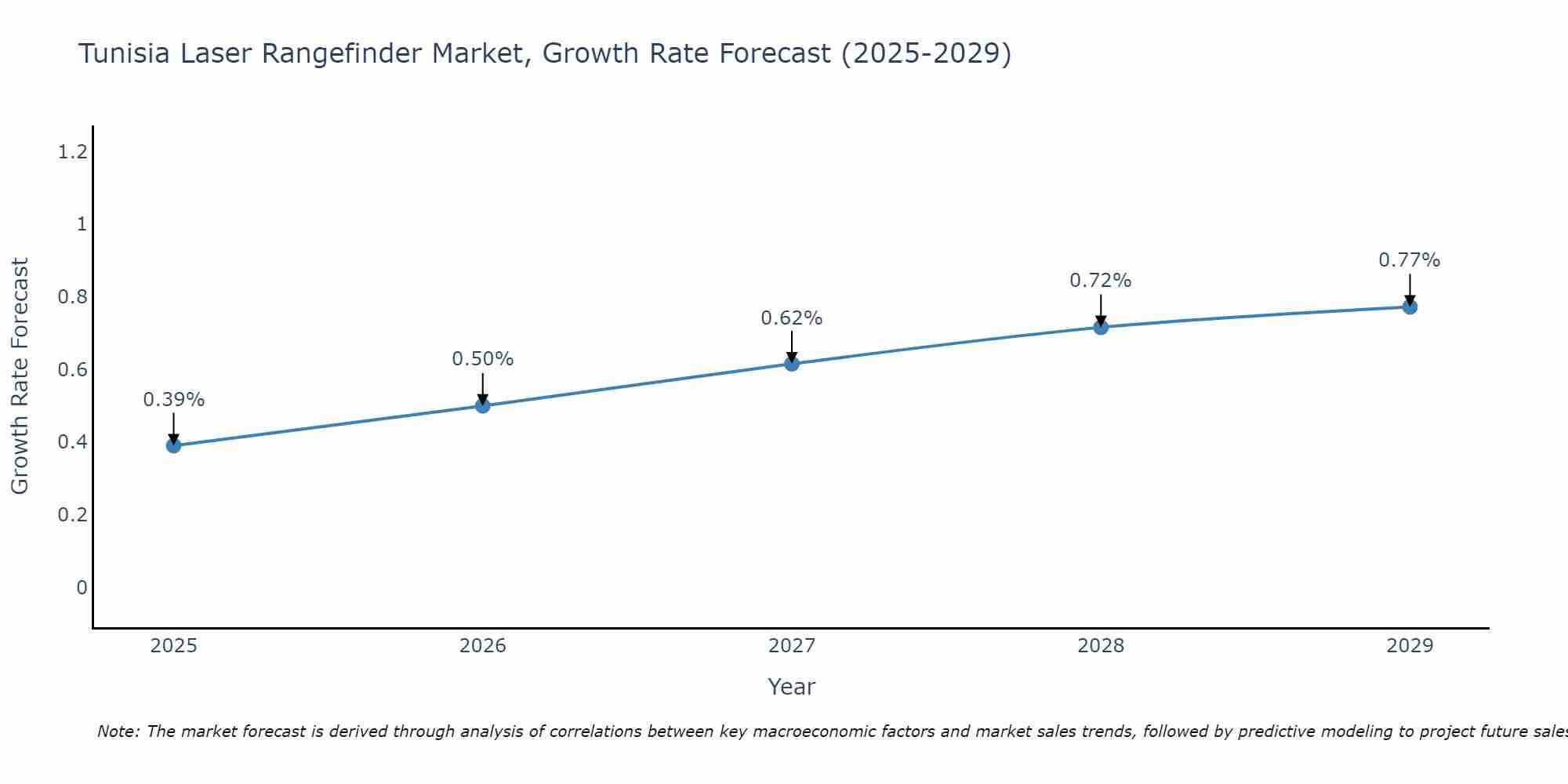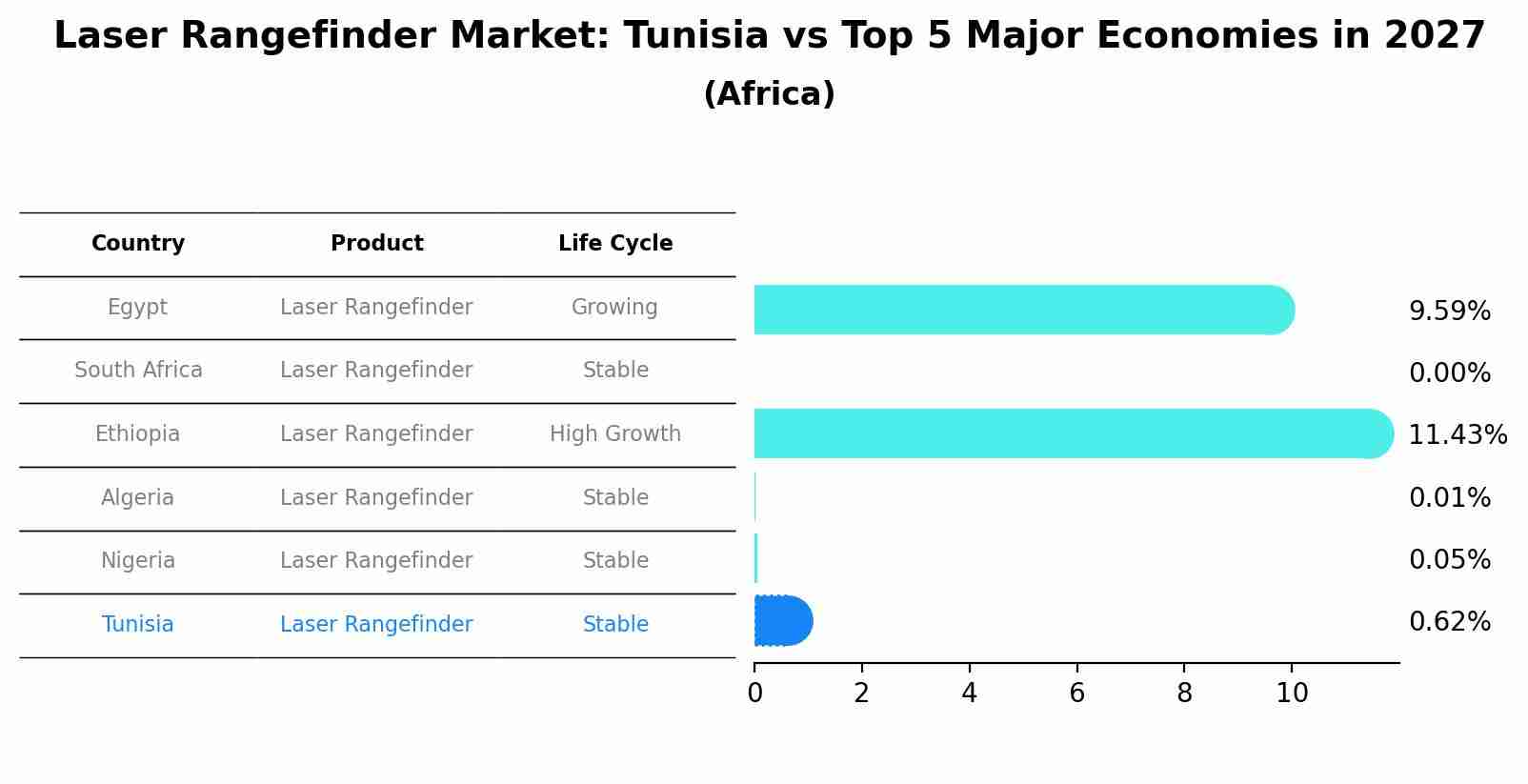Tunisia Laser Rangefinder Market Outlook | Growth, COVID-19 IMPACT, Revenue, Companies, Size, Forecast, Value, Trends, Analysis, Share & Industry
| Product Code: ETC365994 | Publication Date: Aug 2022 | Updated Date: Aug 2025 | Product Type: Market Research Report | |
| Publisher: 6Wresearch | Author: Shubham Padhi | No. of Pages: 75 | No. of Figures: 35 | No. of Tables: 20 |
Tunisia Laser Rangefinder Market Size Growth Rate
The Tunisia Laser Rangefinder Market is poised for steady growth rate improvements from 2025 to 2029. From 0.39% in 2025, the growth rate steadily ascends to 0.77% in 2029.

Laser Rangefinder Market: Tunisia vs Top 5 Major Economies in 2027 (Africa)
By 2027, Tunisia's Laser Rangefinder market is forecasted to achieve a stable growth rate of 0.62%, with Egypt leading the Africa region, followed by South Africa, Ethiopia, Algeria and Nigeria.

Tunisia Laser Rangefinder Market Overview
Tunisia`s laser rangefinder market is expanding with devices for distance measurement, targeting, and surveying applications in military, forestry, and construction sectors. Market dynamics include advancements in laser technology for enhanced accuracy, ruggedized designs for harsh environments, and integration with GPS and imaging systems for comprehensive spatial data collection. The market serves defense agencies, surveying professionals, and outdoor enthusiasts seeking reliable and high-performance rangefinding solutions.
Drivers of the market
The laser rangefinder market in Tunisia is influenced by defense technology, outdoor recreation, and demand for distance measurement devices in military operations, hunting, and sports activities. Laser rangefinders offer accuracy, target acquisition, and environmental ruggedness for range finding, surveillance, and terrain mapping applications. Demand for ballistic calculations, golf course mapping, and laser scanning drives rangefinder adoption, supporting military modernization, outdoor sportsmanship, and recreational activities in Tunisia.
Challenges of the market
In Tunisia, the laser rangefinder market encounters challenges related to military applications and technological advancements. Limited adoption of laser rangefinder systems in defense and security sectors restricts market demand. Moreover, stringent regulatory controls on military-grade equipment and export restrictions influence market entry and operational strategies for manufacturers. Technological obsolescence and competitive pressures from global suppliers also impact product innovation and market positioning strategies.
Government Policy of the market
Government supports military and industrial applications of laser rangefinders, ensuring accuracy and reliability in distance measurement technologies for defense and commercial purposes.
Key Highlights of the Report:
- Tunisia Laser Rangefinder Market Outlook
- Market Size of Tunisia Laser Rangefinder Market, 2024
- Forecast of Tunisia Laser Rangefinder Market, 2031
- Historical Data and Forecast of Tunisia Laser Rangefinder Revenues & Volume for the Period 2018 - 2031
- Tunisia Laser Rangefinder Market Trend Evolution
- Tunisia Laser Rangefinder Market Drivers and Challenges
- Tunisia Laser Rangefinder Price Trends
- Tunisia Laser Rangefinder Porter's Five Forces
- Tunisia Laser Rangefinder Industry Life Cycle
- Historical Data and Forecast of Tunisia Laser Rangefinder Market Revenues & Volume By Type for the Period 2018 - 2031
- Historical Data and Forecast of Tunisia Laser Rangefinder Market Revenues & Volume By Telescope Later Rangefinder for the Period 2018 - 2031
- Historical Data and Forecast of Tunisia Laser Rangefinder Market Revenues & Volume By Hand-held Later Rangefinder for the Period 2018 - 2031
- Historical Data and Forecast of Tunisia Laser Rangefinder Market Revenues & Volume By Application for the Period 2018 - 2031
- Historical Data and Forecast of Tunisia Laser Rangefinder Market Revenues & Volume By Military for the Period 2018 - 2031
- Historical Data and Forecast of Tunisia Laser Rangefinder Market Revenues & Volume By Construction for the Period 2018 - 2031
- Historical Data and Forecast of Tunisia Laser Rangefinder Market Revenues & Volume By Industrial for the Period 2018 - 2031
- Historical Data and Forecast of Tunisia Laser Rangefinder Market Revenues & Volume By Sports for the Period 2018 - 2031
- Historical Data and Forecast of Tunisia Laser Rangefinder Market Revenues & Volume By Forestry for the Period 2018 - 2031
- Historical Data and Forecast of Tunisia Laser Rangefinder Market Revenues & Volume By Others for the Period 2018 - 2031
- Tunisia Laser Rangefinder Import Export Trade Statistics
- Market Opportunity Assessment By Type
- Market Opportunity Assessment By Application
- Tunisia Laser Rangefinder Top Companies Market Share
- Tunisia Laser Rangefinder Competitive Benchmarking By Technical and Operational Parameters
- Tunisia Laser Rangefinder Company Profiles
- Tunisia Laser Rangefinder Key Strategic Recommendations
Frequently Asked Questions About the Market Study (FAQs):
- Single User License$ 1,995
- Department License$ 2,400
- Site License$ 3,120
- Global License$ 3,795
Search
Related Reports
- ASEAN and Thailand Brain Health Supplements Market (2025-2031) | Strategy, Consumer Insights, Analysis, Investment Trends, Opportunities, Growth, Size, Share, Industry, Revenue, Segments, Value, Segmentation, Supply, Forecast, Restraints, Outlook, Competition, Drivers, Trends, Demand, Pricing Analysis, Competitive, Strategic Insights, Companies, Challenges
- ASEAN Bearings Market (2025-2031) | Strategy, Consumer Insights, Analysis, Investment Trends, Opportunities, Growth, Size, Share, Industry, Revenue, Segments, Value, Segmentation, Supply, Forecast, Restraints, Outlook, Competition, Drivers, Trends, Demand, Pricing Analysis, Competitive, Strategic Insights, Companies, Challenges
- Europe Flooring Market (2025-2031) | Outlook, Share, Industry, Trends, Forecast, Companies, Revenue, Size, Analysis, Growth & Value
- Saudi Arabia Manlift Market (2025-2031) | Outlook, Size, Growth, Trends, Companies, Industry, Revenue, Value, Share, Forecast & Analysis
- Uganda Excavator, Crane, and Wheel Loaders Market (2025-2031) | Strategy, Consumer Insights, Analysis, Investment Trends, Opportunities, Growth, Size, Share, Industry, Revenue, Segments, Value, Segmentation, Supply, Forecast, Restraints, Outlook, Competition, Drivers, Trends, Demand, Pricing Analysis, Competitive, Strategic Insights, Companies, Challenges
- Rwanda Excavator, Crane, and Wheel Loaders Market (2025-2031) | Strategy, Consumer Insights, Analysis, Investment Trends, Opportunities, Growth, Size, Share, Industry, Revenue, Segments, Value, Segmentation, Supply, Forecast, Restraints, Outlook, Competition, Drivers, Trends, Demand, Pricing Analysis, Competitive, Strategic Insights, Companies, Challenges
- Kenya Excavator, Crane, and Wheel Loaders Market (2025-2031) | Strategy, Consumer Insights, Analysis, Investment Trends, Opportunities, Growth, Size, Share, Industry, Revenue, Segments, Value, Segmentation, Supply, Forecast, Restraints, Outlook, Competition, Drivers, Trends, Demand, Pricing Analysis, Competitive, Strategic Insights, Companies, Challenges
- Angola Excavator, Crane, and Wheel Loaders Market (2025-2031) | Strategy, Consumer Insights, Analysis, Investment Trends, Opportunities, Growth, Size, Share, Industry, Revenue, Segments, Value, Segmentation, Supply, Forecast, Restraints, Outlook, Competition, Drivers, Trends, Demand, Pricing Analysis, Competitive, Strategic Insights, Companies, Challenges
- Israel Intelligent Transport System Market (2025-2031) | Strategy, Consumer Insights, Analysis, Investment Trends, Opportunities, Growth, Size, Share, Industry, Revenue, Segments, Value, Segmentation, Supply, Forecast, Restraints, Outlook, Competition, Drivers, Trends, Demand, Pricing Analysis, Competitive, Strategic Insights, Companies, Challenges
- Uganda Precast and Aggregate Market (2025-2031) | Strategy, Consumer Insights, Analysis, Investment Trends, Opportunities, Growth, Size, Share, Industry, Revenue, Segments, Value, Segmentation, Supply, Forecast, Restraints, Outlook, Competition, Drivers, Trends, Demand, Pricing Analysis, Competitive, Strategic Insights, Companies, Challenges
Industry Events and Analyst Meet
Our Clients
Whitepaper
- Middle East & Africa Commercial Security Market Click here to view more.
- Middle East & Africa Fire Safety Systems & Equipment Market Click here to view more.
- GCC Drone Market Click here to view more.
- Middle East Lighting Fixture Market Click here to view more.
- GCC Physical & Perimeter Security Market Click here to view more.
6WResearch In News
- Doha a strategic location for EV manufacturing hub: IPA Qatar
- Demand for luxury TVs surging in the GCC, says Samsung
- Empowering Growth: The Thriving Journey of Bangladesh’s Cable Industry
- Demand for luxury TVs surging in the GCC, says Samsung
- Video call with a traditional healer? Once unthinkable, it’s now common in South Africa
- Intelligent Buildings To Smooth GCC’s Path To Net Zero













